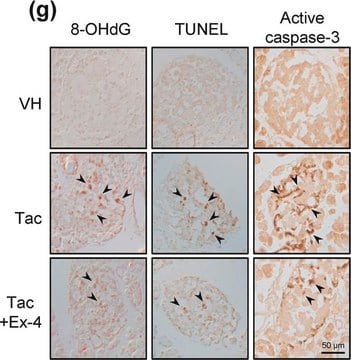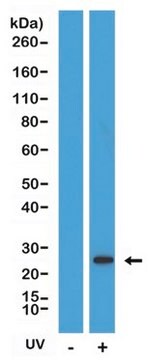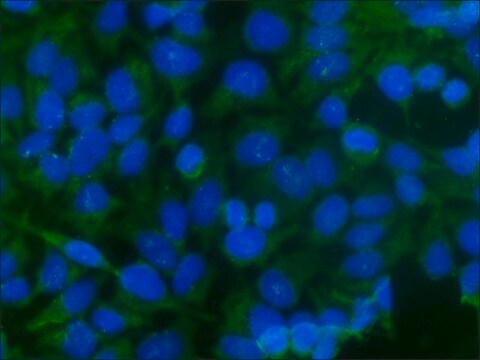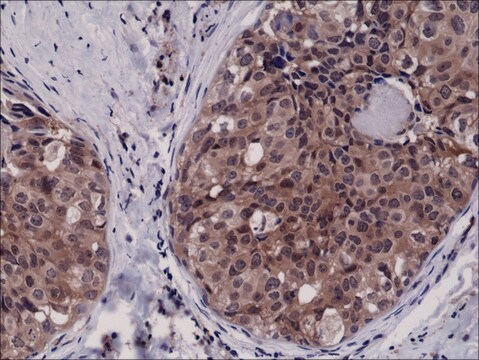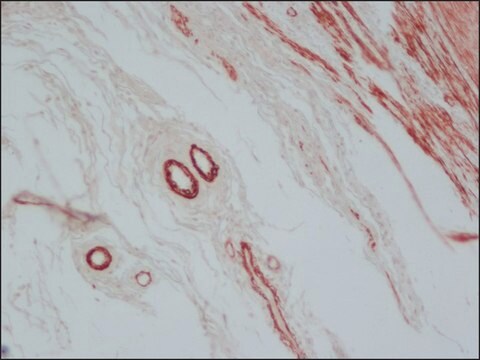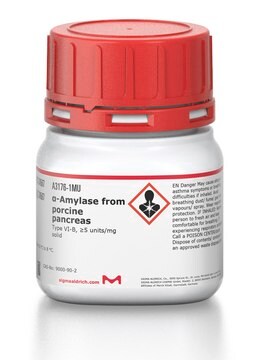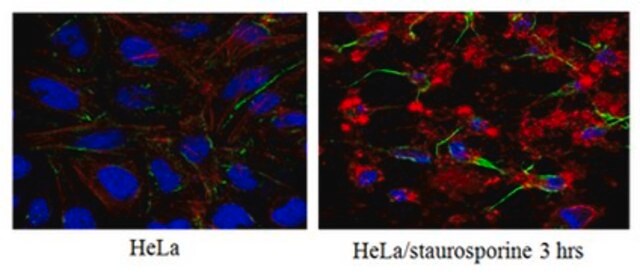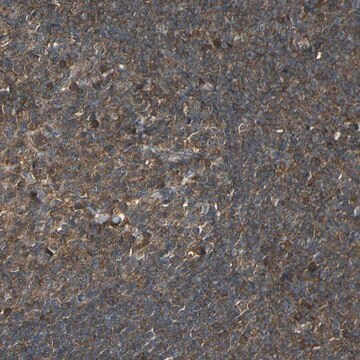C4733
BID, Caspase-8-cleaved from mouse
≥95% (SDS-PAGE), recombinant, expressed in E. coli, buffered aqueous solution
Se connecterpour consulter vos tarifs contractuels et ceux de votre entreprise/organisme
About This Item
Produits recommandés
Produit recombinant
expressed in E. coli
Niveau de qualité
Essai
≥95% (SDS-PAGE)
Forme
buffered aqueous solution
Numéro d'accès UniProt
Conditions d'expédition
dry ice
Température de stockage
−20°C
Informations sur le gène
mouse ... Bid(12122)
Description générale
Mouse BID cleaved with caspase-8 generates the amino-terminal fragment (amino acids 1-59, 7 kDa) and the carboxy-terminal fragment (amino acids 60-195, 15 kDa). On size exclusion chromatography cleaved BID elutes at 27 kDa indicating that the fragments remain associated.
Actions biochimiques/physiologiques
Caspase-8-cleaved BID relocates from the cytosol to the outer mitochondrial membrane where its interaction with Bak alters mitochondrial membrane permeability.
Forme physique
0.2 μm filtered solution in 25 mM HEPES, pH 7.5, and 0.1 M KCl.
Remarque sur l'analyse
Measured by its ability to induce cytochrome c release from isolated mouse liver mitochondria.
Code de la classe de stockage
10 - Combustible liquids
Classe de danger pour l'eau (WGK)
nwg
Point d'éclair (°F)
Not applicable
Point d'éclair (°C)
Not applicable
Faites votre choix parmi les versions les plus récentes :
Certificats d'analyse (COA)
Lot/Batch Number
Vous ne trouvez pas la bonne version ?
Si vous avez besoin d'une version particulière, vous pouvez rechercher un certificat spécifique par le numéro de lot.
Déjà en possession de ce produit ?
Retrouvez la documentation relative aux produits que vous avez récemment achetés dans la Bibliothèque de documents.
M C Wei et al.
Genes & development, 14(16), 2060-2071 (2000-08-19)
TNFR1/Fas engagement results in the cleavage of cytosolic BID to truncated tBID, which translocates to mitochondria. Immunodepletion and gene disruption indicate BID is required for cytochrome c release. Surprisingly, the three-dimensional structure of this BH3 domain-only molecule revealed two hydrophobic
J Zha et al.
Science (New York, N.Y.), 290(5497), 1761-1765 (2000-12-02)
Many apoptotic molecules relocate subcellularly in cells undergoing apoptosis. The pro-apoptotic protein BID underwent posttranslational (rather than classic cotranslational) N-myristoylation when cleavage by caspase 8 caused exposure of a glycine residue. N-myristoylation enabled the targeting of a complex of p7
X Luo et al.
Cell, 94(4), 481-490 (1998-09-04)
We report here the purification of a cytosolic protein that induces cytochrome c release from mitochondria in response to caspase-8, the apical caspase activated by cell surface death receptors such as Fas and TNF. Peptide mass fingerprinting identified this protein
H Li et al.
Cell, 94(4), 491-501 (1998-09-04)
We report here that BID, a BH3 domain-containing proapoptotic Bcl2 family member, is a specific proximal substrate of Casp8 in the Fas apoptotic signaling pathway. While full-length BID is localized in cytosol, truncated BID (tBID) translocates to mitochondria and thus
BCL-2 family members and the mitochondria in apoptosis.
A Gross et al.
Genes & development, 13(15), 1899-1911 (1999-08-13)
Notre équipe de scientifiques dispose d'une expérience dans tous les secteurs de la recherche, notamment en sciences de la vie, science des matériaux, synthèse chimique, chromatographie, analyse et dans de nombreux autres domaines..
Contacter notre Service technique